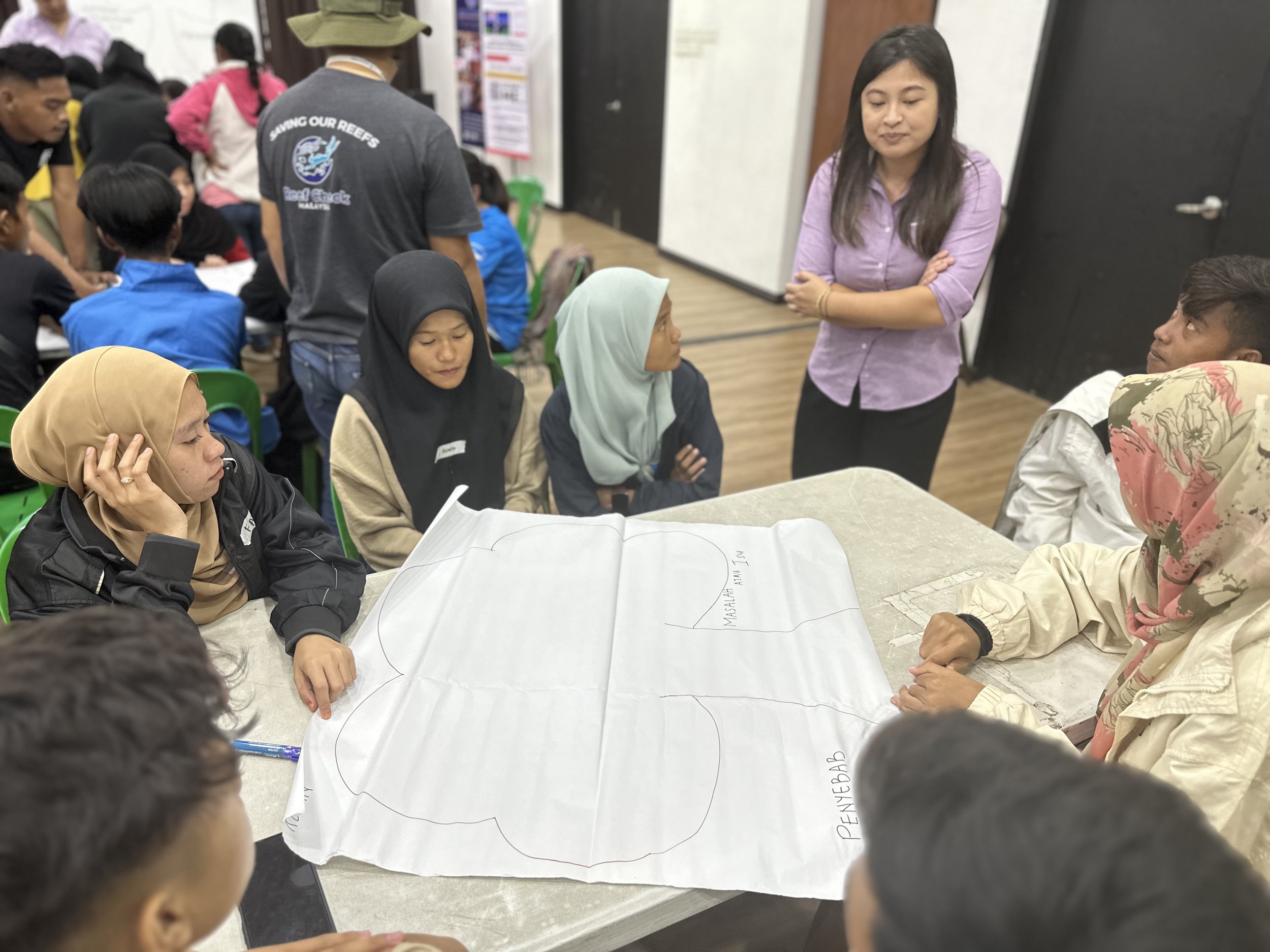Kota Kinabalu
In July, RCM conducted a 3rd waste management workshop with the participants of the pilot waste management in Kg. Baru-Baru, sponsored by Coca Cola.
The program presented the achievements throughout the 3-month trial period and also addresses the challenges moving forward through a two-way discussion with the participants. All of them showed high intentions on continuing the program to make their village a better place.
Our Sabah team also conducted a workshop with the youths from Kg. Panji, Kg. Puyut and Kg Air, Lahad Datu, to teach them about proper trash disposal methods and also how to creatively upscale used materials into a profitable or usable product. This workshop was organised by Kelab Belia Tinagayan and was part of the program “Komuniti Hijau Kitar Semula Lahad Datu”.
Youths showing their creative side during the workshop in Lahad Datu
Our colleague, Nadhirah, speaking at the workshop in Kg. Baru Baru
At the end of August, our colleagues in Sabah presented their findings from the Darvel Bay Expedition, which was conducted in October 2022. The seminar was joined by other governmental and NGO organisations such as Sabah Parks, WWF, and UCSF. The findings from the seminar will be used as baseline data for the management of Darvel Bay moving forward when it is gazetted into a marine park.
Nadhirah, presenting the findings on behalf of RCM
Cintai Mantanani
The waste management programme introduced a couple of years ago continues to show great progress and is helping the locals deal with the issue of trash on the island.
In September, a total of 1412.9kg of trash collected since July 2023 was transported out of the island and sent to the landfill in Kayu Madang. We’re still seeking better solutions in the long run with regard to the transportation of trash out of the island and its costs.
This includes working with local authorities and the state government. We’d love to hear from you on any suggestions you may have to offer to help us solve this issue!
Bags of trash, ready to be transported out of the island
Our Cintai Mantanani team was also busy completing an order of 400 magnets, made by Coca-Cola, who are one of our sponsors. These magnets are made from recycled plastic bottle caps which are melted and moulded into the desired shape.
The magnets that are made from melted plastic bottle caps
In 2022, we completed a two-year project called “Establishing Community-Based Eco-Tourism in Mantanani”, funded by GEF SGP UNDP Malaysia.
One of the program components is the Homestays Improvement Program, whereby the Homestay operators are taught to improve their quality and services. The project has paid off quite well, as the earnings of these homestays have increased every year, with the amount earned thus far in 2023 being more than half of the earnings just two years ago in 2021.
Semporna
Our Sabahan colleagues have been conducting and attending several trainings in this past quarter. Some of them include:
An EcoDiver training was conducted at Mabul Island involving 11 youths from Mabul and four EcoDiver trainers. The training is part of the Marine Conservation Dive Training, a youth empowerment project by Reef Check Malaysia, funded by the CIMB Foundation.
Participants during the EcoDiver training
A coral bleaching monitoring training for youths in Mabul and Larapan, also part of the Marine Conservation Dive Training funded by CIMB Foundation.
The training involved 15 youths from the Mabul and Larapan communities and 4 RCM trainers. The training used the standardized method of Reef Check Survey using line transect and photo quadrat to estimate bleaching in coral reef colonies and population.
Practical session during the bleaching monitoring training
A first-ever workshop on gender equality was conducted in partnership with the Society for Equality, Respect and Trust for All Sabah (SERATA) and Green Semporna.
50 youths from Mabul, Kulapuan and Larapan Islands joined the workshop
The workshop was participated by 50 youths from Mabul, Kulapuan and Larapan Islands who engaged in empowering sessions on tackling gender stereotypes and addressing inclusive gender participation in marine conservation efforts.
The program was also participated by women from Tioman Marine Conservation Group (TMCG), who shared their experiences working in marine conservation work in Tioman Island.
The program is part of the ongoing marine conservation empowerment activities funded by the International Climate Initiative (IKI) Small Grants.
The first ever workshop on gender equality
RCM staff participated in a series of online trainings on Reef Star Welding. These MARRS Reef Star frames that are to be used for the project has to be made by trained welders.
These local welders were taught about the suitable materials used for the frames, the angle of the steel and all other requirements for the frames to be used.
The next training was to introduce the items and equipment that will be used for the coral restoration project, from the preparation process and site assessment until the deployment of the MARRS Reef Stars.
The third training in this series was on site selection, while the fourth focused on MARRS coral restoration techniques.
Training in progress for MARSS restoration technique
Our colleagues have also been working with local schools in Semporna, conducting education and awareness programmes among primary and secondary students.
The main topic focused on was plastic pollution, which is an issue around Semporna. SC Johnson funds this education programme, and we also had representatives from Green Semporna join us on a few of these activities. In total, our team visited 4 schools in the last quarter.
Our colleague in action during a school awareness programme











